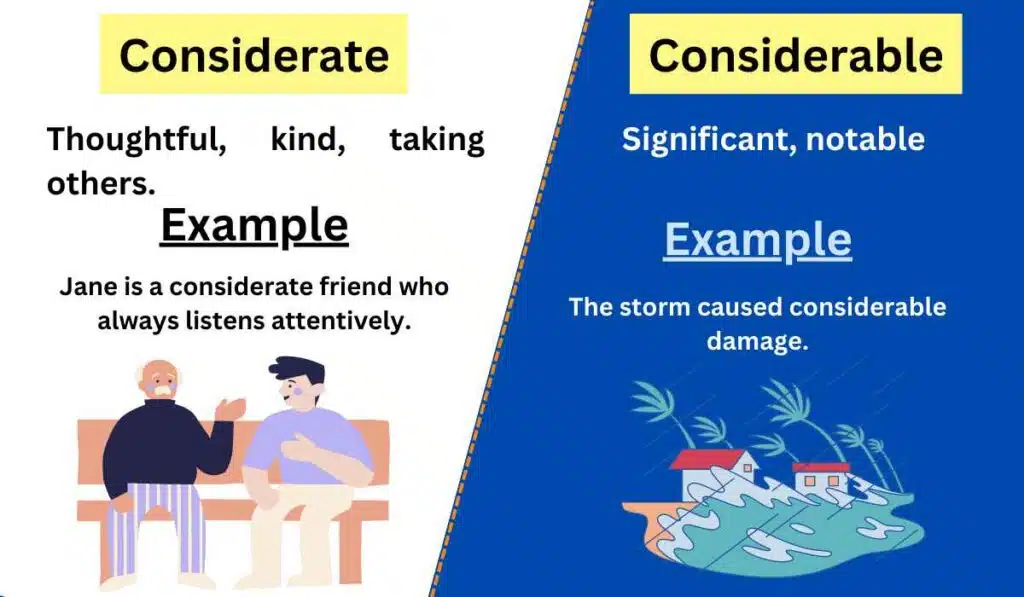Considerate vs. Considerable-Difference between with example
In our interactions and discussions, we often come across the words “considerate” and “considerable.” While they may appear similar, they have distinct meanings and contexts of usage.

Understanding the difference between these terms is important to communicate effectively and accurately.
In this article, we will explore the meanings of “considerate” and “considerable,” provide examples to illustrate their usage, and highlight the contrasts between the two. Let’s delve into the nuances of “considerate” and “considerable.”
Meanings and Examples
Considerate Meaning
Adjective: Considerate describes someone who is thoughtful, kind, and takes others’ feelings and needs into account.
Considerate Examples
- Jane is a considerate friend who always listens attentively when others are speaking.
- The considerate driver allowed the pedestrian to cross the road safely before proceeding.
- John showed his considerate nature by helping his elderly neighbor carry groceries up the stairs.
- The teacher was considerate and provided extra support to students who were struggling with the subject.
- Being considerate, Sarah sent a thank-you note to express her gratitude for the thoughtful gift.
Considerable Meaning
Adjective: Considerable refers to something significant, notable, or of substantial size, quantity, or importance.
Considerable Examples
- The company made a considerable profit this year, exceeding expectations.
- Mary put in a considerable amount of effort into her research project, resulting in a high-quality report.
- The storm caused considerable damage to the coastal town, with many houses and infrastructure being affected.
- The team faced considerable challenges during the project, but they managed to overcome them through perseverance.
- The book received considerable attention from critics and readers, becoming a bestseller.
Differences between Considerate and Considerable
| Criteria | Considerate | Considerable |
| Meaning | Thoughtful, kind, taking others’ feelings into account | Significant, notable, of substantial size or importance |
| Part of Speech | Adjective | Adjective |
| Pronunciation | kənˈsɪdərət | kənˈsɪdərəb(ə)l |
| Usage | Describing someone’s thoughtful nature | Describing something significant or notable |
Usage in a Paragraph
Being considerate towards others is an important trait that fosters harmonious relationships. A considerate person shows empathy, listens attentively, and acknowledges the feelings and needs of others. They take actions to make others comfortable and valued. On the other hand, when we talk about a considerable matter, we refer to something that holds significance or has notable impact. It could be a considerable achievement, such as surpassing a sales target or completing a complex project successfully. Similarly, a considerable amount of time, effort, or resources may be required to tackle a challenging task. The word “considerable” emphasizes the magnitude, importance, or scale of something.
While “considerate” relates to the thoughtful and kind nature of individuals, “considerable” pertains to something significant or notable in terms of size, importance, or impact. By understanding the distinctions between these words, we can use them accurately to convey our thoughts and ideas. Whether it is demonstrating consideration towards others or recognizing the significance of a situation, using “considerate” and “considerable” appropriately enhances effective communication.







Leave a Reply